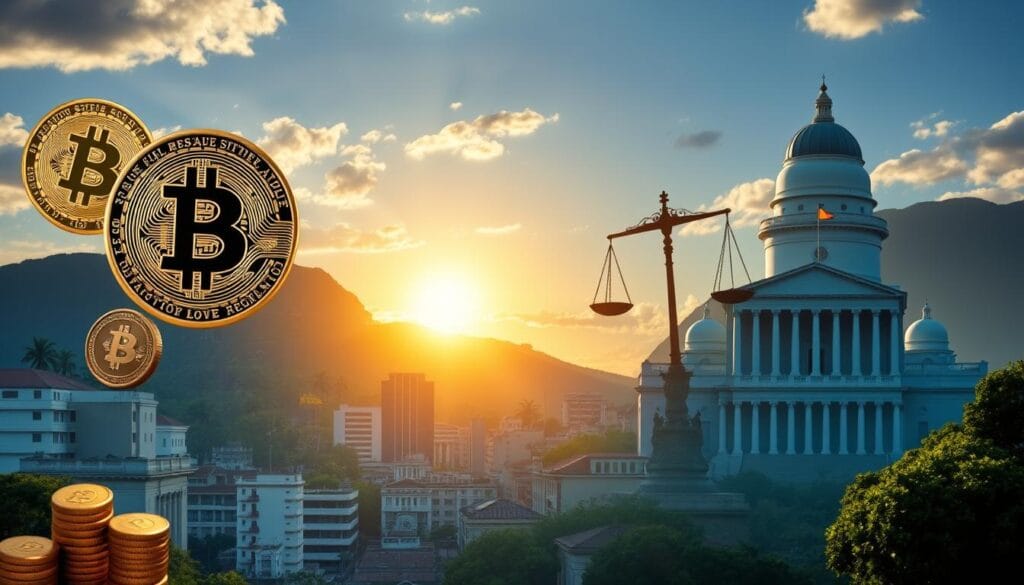El Salvador Bitcoin Bill: Balancing Regulation and Ambition
The El Salvador Bitcoin Bill has ignited intense debate within both crypto circles and traditional finance. Once hailed as the first nation to adopt Bitcoin as legal tender, El Salvador is now signaling a shift: new legislation is set to limit Bitcoin’s mandatory use while increasing government oversight. Yet, paradoxically, President Nayib Bukele continues doubling down on accumulating more Bitcoin for the state treasury.
This dual-track approach raises critical questions: Is El Salvador retreating from its bold crypto experiment, or is it recalibrating for long-term sustainability?
Why the El Salvador Bitcoin Bill Matters
When El Salvador made Bitcoin legal tender in 2021, it shocked the world. Citizens could pay for coffee, groceries, or even taxes in BTC. But three years later, the El Salvador Bitcoin Bill suggests that the government is reassessing the scope of its experiment.
The new legislation introduces regulatory guardrails, shifting Bitcoin from a compulsory payment method to an optional one. Businesses are no longer obligated to accept it, and the government is reducing its role in managing the controversial state-backed Chivo Wallet.
Experts argue this pivot reflects pragmatism rather than retreat. By tightening regulations, El Salvador aims to address issues of transparency, illicit activity, and consumer protection—concerns that have long shadowed the nation’s crypto-first image.
IMF reports and regulatory pressures from global institutions likely influenced this measured approach. Still, the country maintains its unique role as a real-world test case for nationwide crypto adoption.
Key Provisions of the Bitcoin-Limiting Bill
1. Bitcoin Use Becomes Optional
Under the El Salvador Bitcoin Bill, businesses can choose whether to accept Bitcoin. This marks a departure from the original 2021 mandate, which required all merchants to accommodate crypto payments.
2. Stricter Oversight for Exchanges
Crypto exchanges must now register with government authorities. This step mirrors frameworks in global regulatory hubs, pushing for greater accountability and security in financial transactions.
3. Scaling Back Chivo Wallet
The government will reduce its role in the state-managed Chivo Wallet, which had faced criticism over technical glitches and allegations of fraud. The move is designed to promote private-sector innovation while distancing state finances from operational risks.
President Bukele’s Countermove: More Bitcoin
Even as legislation curbs the scope of Bitcoin use, President Bukele remains steadfast in his commitment to BTC. In fact, he has continued expanding El Salvador’s national Bitcoin holdings, now estimated at over 2,000 BTC.
This decision highlights the paradox at the heart of El Salvador’s crypto strategy: a government that restricts domestic use while betting on Bitcoin as a long-term sovereign asset. Bukele has framed these acquisitions as a hedge against inflation and a way to position El Salvador as a crypto hub for investors.
Market volatility remains a challenge. Bitcoin’s price has swung between $20,000 and $60,000 in recent years. Yet, Bukele’s administration argues that the benefits of financial inclusion, cheaper remittances, and international visibility outweigh the risks.
Implications for Bitcoin Adoption in El Salvador
The passage of the El Salvador Bitcoin Bill has left investors and citizens alike questioning what comes next. On the ground, Bitcoin adoption has been mixed: while some businesses embraced it, many citizens continued relying on dollars. Making crypto use optional could reduce friction for skeptical business owners while still leaving the door open for enthusiasts.
Meanwhile, international observers see the bill as a natural evolution. By creating regulatory frameworks, El Salvador may reassure investors who were concerned about the absence of oversight. A safer environment could, paradoxically, strengthen long-term Bitcoin adoption.
For global markets, El Salvador remains a symbolic case study. Its next moves will influence debates in countries considering their own national-level crypto adoption strategies.
Public and Market Reactions
Public response to the El Salvador Bitcoin Bill has been divided. Critics view it as evidence that the bold experiment is faltering. Supporters counter that regulation is necessary for legitimacy and broader adoption.
The crypto market, meanwhile, has largely interpreted Bukele’s continued Bitcoin purchases as a bullish signal. International investors see El Salvador as a nation unwilling to abandon its pioneering role, even if adjustments are being made along the way.
FAQ: Understanding the El Salvador Bitcoin Bill
What is the El Salvador Bitcoin Bill?
The El Salvador Bitcoin Bill introduces regulations that make Bitcoin use optional for businesses, tighten oversight for exchanges, and reduce the government’s role in the Chivo Wallet.
How does the El Salvador Bitcoin Bill affect businesses?
Businesses are no longer legally required to accept Bitcoin payments. They can opt in based on preference, reducing compliance pressure while keeping adoption possible.
Why is President Bukele still buying Bitcoin?
Despite regulatory limits, Bukele continues accumulating Bitcoin as part of a sovereign strategy. He sees it as a long-term store of value and a way to boost El Salvador’s role in global crypto markets.
Does the El Salvador Bitcoin Bill mean the country is abandoning Bitcoin?
Not exactly. The bill signals recalibration, not abandonment. El Salvador remains committed to Bitcoin but seeks to balance innovation with regulation.
What does the El Salvador Bitcoin Bill mean for global crypto regulation?
El Salvador’s case is being watched worldwide. If successful, it could influence how other governments adopt crypto while ensuring stability and investor protection.
Conclusion: The Future of El Salvador’s Bitcoin Experiment
The El Salvador Bitcoin Bill underscores a fundamental tension: how to embrace disruptive innovation while safeguarding economic stability. Far from a retreat, the legislation suggests a pivot toward sustainability and investor protection.
Bukele’s continued Bitcoin accumulation signals that the nation’s crypto vision remains alive, even if recalibrated. The next phase of El Salvador’s Bitcoin journey will depend on whether regulation can coexist with ambition—and whether the nation’s bold experiment can still inspire others in the evolving world of digital finance.
]

